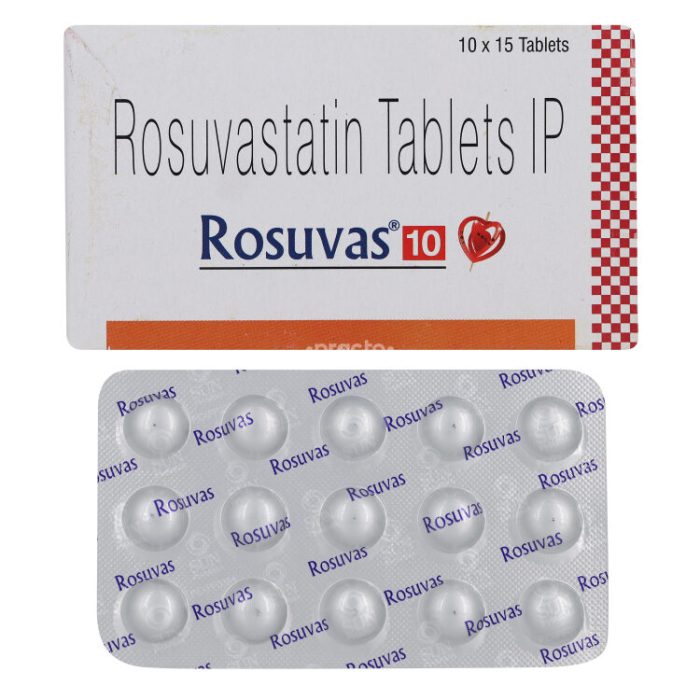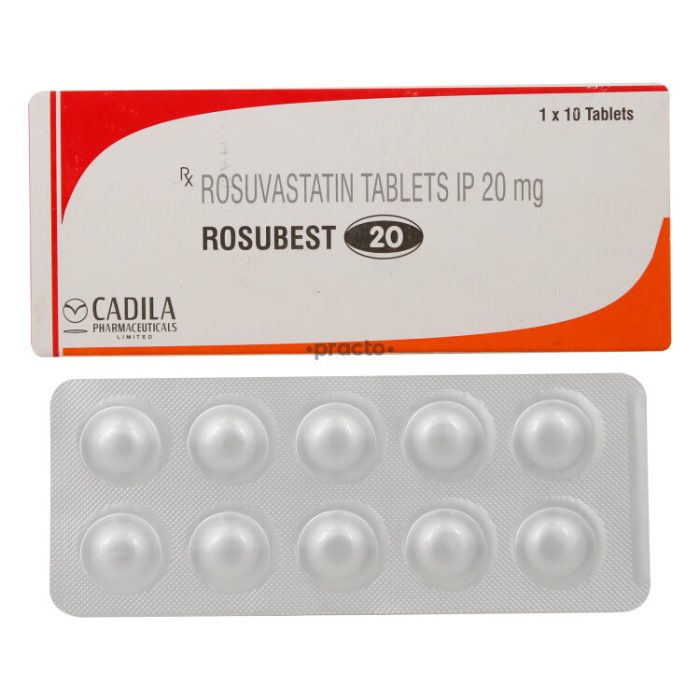Rosuvastatin uses extend beyond simply lowering cholesterol; it plays a crucial role in safeguarding cardiovascular health. This medication, often prescribed for high cholesterol, familial hypercholesterolemia, and mixed dyslipidemia, works by inhibiting the production of cholesterol in the liver, effectively reducing the levels of LDL cholesterol, the “bad” cholesterol, in the bloodstream.
By targeting this key aspect of cholesterol metabolism, rosuvastatin helps prevent the buildup of plaque in arteries, a major contributor to heart disease and stroke. This preventative measure makes it a valuable tool in managing cardiovascular risk, particularly for individuals with a family history of heart disease or those with other risk factors like diabetes or high blood pressure.
Drug Interactions: Rosuvastatin Uses

Rosuvastatin, like many medications, can interact with other drugs, potentially altering its effectiveness or increasing the risk of side effects. It’s crucial to be aware of these interactions and to inform your healthcare provider about all medications and supplements you’re taking, including over-the-counter drugs and herbal remedies.
Common Medications That Interact with Rosuvastatin
It’s essential to understand the potential consequences of these interactions. Some medications may increase the levels of rosuvastatin in the body, leading to a higher risk of side effects, particularly muscle problems. Others may decrease the effectiveness of rosuvastatin, reducing its ability to lower cholesterol levels.
- Statins: Taking rosuvastatin with other statins, such as atorvastatin or simvastatin, can increase the risk of muscle problems. This is because statins work by inhibiting the same enzyme responsible for cholesterol production, and combining them can lead to higher levels of statins in the body.
- Fibrates: Fibrates, such as gemfibrozil or fenofibrate, are medications used to lower cholesterol levels. When taken with rosuvastatin, they can increase the risk of muscle problems. This is because fibrates also inhibit the same enzyme as statins, leading to higher levels of both medications in the body.
- Cyclosporine: Cyclosporine is an immunosuppressant medication used to prevent organ rejection after transplantation. Taking it with rosuvastatin can significantly increase the risk of muscle problems, as cyclosporine can inhibit the metabolism of rosuvastatin.
- Macrolide Antibiotics: Macrolide antibiotics, such as erythromycin or clarithromycin, can inhibit the metabolism of rosuvastatin, leading to higher levels of the medication in the body and an increased risk of side effects, particularly muscle problems.
- Grapefruit Juice: Grapefruit juice can inhibit the metabolism of rosuvastatin, leading to higher levels of the medication in the body. This can increase the risk of side effects, such as muscle problems.
Precautions and Contraindications
Rosuvastatin, like other statins, can cause certain side effects and interact with other medications. It’s crucial to understand the potential risks and precautions associated with rosuvastatin use to ensure safe and effective treatment.
Contraindications, Rosuvastatin uses
Rosuvastatin is contraindicated in certain situations, meaning it should not be used. These contraindications include:
- Active liver disease: Rosuvastatin is metabolized in the liver, and liver dysfunction can increase the risk of adverse effects.
- Pregnancy: Rosuvastatin is classified as pregnancy category X, meaning it has been shown to cause fetal harm.
- Breastfeeding: It is unknown if rosuvastatin is excreted in breast milk.
- Hypersensitivity to rosuvastatin or any component of the medication: Individuals with known allergies to rosuvastatin or any of its ingredients should avoid using it.
Precautions
While not contraindicated, rosuvastatin should be used with caution in certain patient populations.
Patients with Kidney Disease
Rosuvastatin is primarily excreted in the urine, so patients with kidney disease may need dose adjustments to prevent drug accumulation and potential toxicity.
Patients with Muscle Disease
Rosuvastatin can cause muscle-related side effects, such as myopathy and rhabdomyolysis. These risks are higher in patients with pre-existing muscle disorders, such as muscular dystrophy or hypothyroidism.
Patients Taking Certain Medications
Rosuvastatin can interact with certain medications, potentially increasing the risk of side effects. For example, co-administration with certain antibiotics (e.g., clarithromycin, erythromycin) or antifungal medications (e.g., itraconazole, ketoconazole) can raise rosuvastatin levels in the blood, increasing the risk of muscle problems.
Patients with a History of Alcohol Abuse
Alcohol abuse can increase the risk of liver damage, and rosuvastatin can also impact the liver. Therefore, it is crucial to avoid alcohol consumption while taking rosuvastatin.
Importance of Medical Evaluation
Before starting rosuvastatin therapy, a thorough medical evaluation is essential. This evaluation should include:
- Medical history: This helps identify any pre-existing conditions that could increase the risk of rosuvastatin-related complications.
- Physical examination: This allows the healthcare professional to assess the patient’s overall health and identify any potential risk factors.
- Laboratory tests: These may include liver function tests, kidney function tests, and muscle enzyme levels to assess the patient’s baseline health and monitor for any adverse effects during treatment.
Rosuvastatin and Lifestyle Modifications
Rosuvastatin is a powerful tool in managing high cholesterol, but its effectiveness can be significantly enhanced when combined with lifestyle modifications. By adopting healthy habits, you can maximize the benefits of rosuvastatin and improve your overall well-being.
Importance of Lifestyle Modifications
Lifestyle changes play a crucial role in lowering cholesterol levels and reducing the risk of heart disease. When combined with rosustatin therapy, these modifications can amplify the drug’s effectiveness and contribute to long-term cardiovascular health.
Research and Development

Rosuvastatin, a widely prescribed statin medication, continues to be a subject of ongoing research and development. Researchers are exploring new applications for this drug, investigating its long-term effects, and refining its use in various clinical settings.
Ongoing Research and Potential Uses
Ongoing research related to rosuvastatin focuses on its potential uses in treating various medical conditions beyond its established role in lowering cholesterol levels.
- Cardiovascular Disease Prevention: Studies are investigating rosuvastatin’s potential in preventing cardiovascular disease in individuals at high risk but without existing heart disease. This research explores whether rosuvastatin can be used as a preventative measure for individuals with risk factors like high blood pressure, diabetes, or family history of heart disease.
- Neurological Conditions: Emerging research suggests a possible role for rosuvastatin in treating certain neurological conditions, such as Alzheimer’s disease and Parkinson’s disease. Studies are exploring the drug’s impact on brain inflammation, amyloid beta plaque formation, and cognitive function in these conditions.
- Cancer: Some research suggests that rosuvastatin may have potential anti-cancer properties. Studies are investigating its effects on cancer cell growth and proliferation in various types of cancer, including breast cancer, prostate cancer, and lung cancer.
Long-Term Effects of Rosuvastatin Therapy
While rosustatin has been shown to be effective in lowering cholesterol levels and reducing the risk of cardiovascular disease, long-term studies are ongoing to understand its potential long-term effects. Researchers are examining the long-term impact of rosuvastatin therapy on various aspects of health, including:
- Muscle Health: Some studies have suggested a possible association between long-term statin use and muscle weakness or damage. Ongoing research aims to better understand the risk of muscle-related side effects and develop strategies to mitigate them.
- Cognitive Function: Some studies have investigated a possible association between statin use and cognitive decline. While some studies have found no association, others have suggested a possible link, particularly in individuals with pre-existing cognitive impairment. Ongoing research aims to clarify the potential impact of rosustatin on cognitive function.
- Overall Health Outcomes: Long-term studies are also investigating the overall health outcomes associated with rosuvastatin therapy. Researchers are examining the long-term effects of the drug on various health indicators, including cardiovascular health, diabetes management, and overall mortality rates.
Future Applications of Rosuvastatin
The ongoing research on rosustatin suggests that it may have future applications in treating various medical conditions beyond its current uses.
- Inflammation: Research is exploring the potential of rosuvastatin to reduce inflammation in various conditions, including autoimmune diseases and inflammatory bowel disease. Studies are investigating its ability to modulate inflammatory pathways and reduce inflammation-related symptoms.
- Wound Healing: Some research suggests that rosuvastatin may promote wound healing by stimulating cell growth and reducing inflammation. Studies are investigating its potential use in treating chronic wounds, such as diabetic foot ulcers and pressure ulcers.
- Metabolic Disorders: Research is exploring the potential of rosuvastatin in treating metabolic disorders, such as obesity and type 2 diabetes. Studies are investigating its effects on insulin sensitivity, glucose metabolism, and lipid profiles in these conditions.
Ethical Considerations

The use of rosuvastatin, like any other medication, raises ethical considerations that must be carefully addressed. These considerations involve ensuring equitable access to treatment, managing the cost of medication, obtaining informed consent from patients, and respecting patient autonomy.
Access to Medication
Access to rosuvastatin, like any other medication, is a crucial ethical concern. It’s essential that all individuals who require rosuvastatin have access to it, regardless of their financial status, geographical location, or other factors. This means addressing issues like affordability, insurance coverage, and the availability of medication in underserved areas.
Cost of Medication
The cost of rosuvastatin can be a significant barrier to access for many patients. High drug prices can force individuals to choose between essential medication and other necessities, leading to non-compliance with treatment. This raises ethical concerns about the affordability and equitable distribution of medication.
Informed Consent
Informed consent is a fundamental ethical principle in healthcare. Patients must be fully informed about the potential benefits and risks of rosuvastatin therapy before making a decision about treatment. This includes understanding the medication’s effectiveness, potential side effects, and alternative treatment options.
Patient Autonomy
Rosuvastatin therapy can have a significant impact on a patient’s lifestyle and autonomy. Patients must be empowered to make informed decisions about their treatment, including whether to start, continue, or discontinue therapy. Healthcare professionals should respect patient preferences and work collaboratively with them to achieve their treatment goals.
Role of Healthcare Professionals
Healthcare professionals play a crucial role in ensuring the ethical and responsible use of rosuvastatin. They must be knowledgeable about the medication’s benefits and risks, provide accurate and unbiased information to patients, and respect patient autonomy. They should also advocate for equitable access to medication and address concerns about affordability and cost.
Rosuvastatin’s impact on cardiovascular health goes beyond simply lowering cholesterol. It empowers individuals to take control of their heart health by reducing their risk of heart attacks, strokes, and other cardiovascular complications. This medication, when combined with healthy lifestyle modifications, provides a comprehensive approach to preventing and managing cardiovascular disease.
Rosuvastatin is a medication used to lower cholesterol levels in the blood. It works by blocking an enzyme in the liver that is responsible for producing cholesterol. While rosuvastatin primarily focuses on cholesterol, another medication, dulaglutide , is used to manage type 2 diabetes by helping the body regulate blood sugar levels. Both rosuvastatin and dulaglutide are important tools in managing chronic health conditions, each addressing different aspects of overall health.